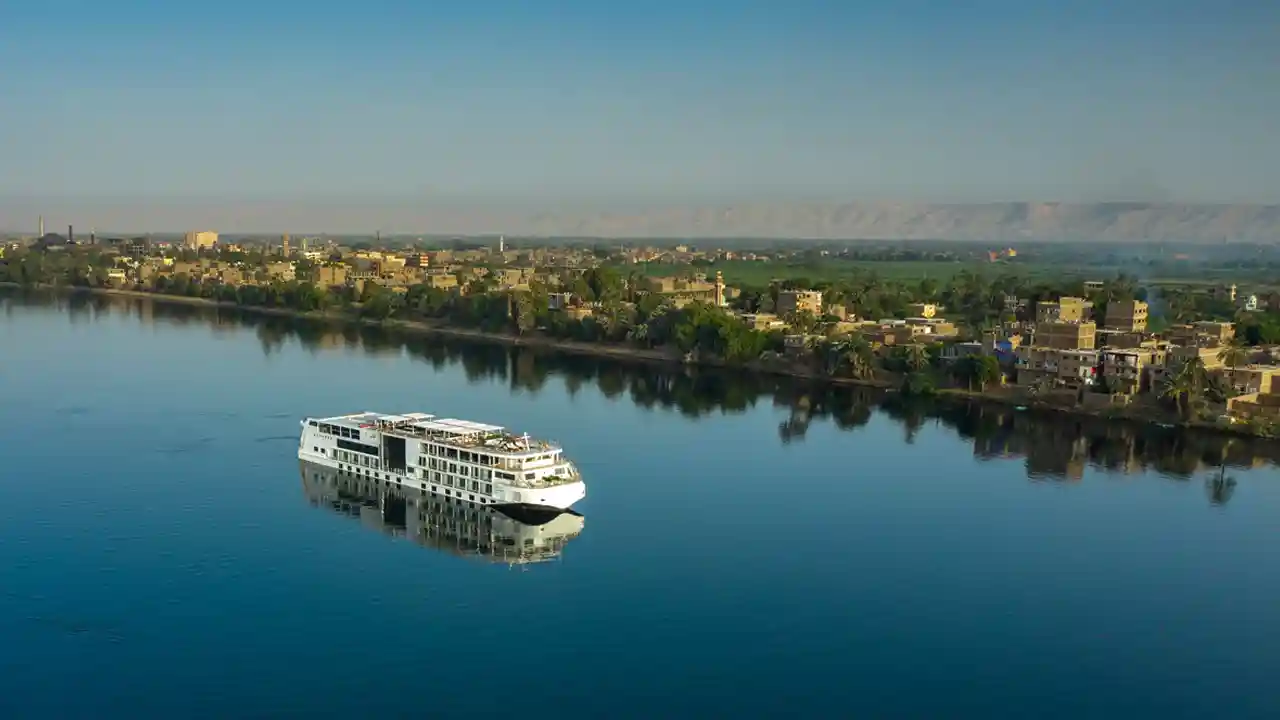The Nile, flowing through the heart of Egypt, has been a lifeline of civilization for thousands of years. As you embark on this journey along
the Nile, each bend in the river offers a story, each ruin has a legend. This expedition will unveil the historical magnificence embedded in the landscape of Egypt, inviting you to walk in the footsteps of pharaohs and discover ancient treasures hidden in plain sight.
The Pyramids of Giza
No journey along the Nile would be complete without exploring the awe-inspiring Pyramids of Giza. Standing as an unrivaled feat of engineering and architecture, these pyramids have captivated travelers’ imaginations for millennia. They serve as enduring sentinels of Egypt’s glorious past.
Luxor Temple
As the sun sets, the Luxor Temple comes alive with a symphony of lights that highlight its magnificent architecture. This temple complex is a testament to the architectural ingenuity of the ancient Egyptians, featuring colossal statues of Ramses II and avenues lined with sphinxes.
Karnak Temple
Just north of Luxor, Karnak Temple stands as a staggering complex of decayed temples, chapels, and pylons. It's a place where history speaks through its detailed hieroglyphic inscriptions and massive columns that seemingly reach for the heavens.
Valley of the Kings
Hidden in the hills on the west bank of the Nile, the Valley of the Kings is the burial ground of pharaohs such as Tutankhamun and Seti I. This necropolis of intricately decorated tombs offers a glimpse into the elaborate preparations for the afterlife.
Abu Simbel
Further along the Nile, near the Sudanese border, the colossal statues of Abu Simbel gaze out across the lake. Carved out of a mountainside, these temples are a powerful reminder of the might of Pharaoh Ramses II and the gods to whom he dedicated these sanctuaries.
Aswan High Dam
A marvel of modern engineering, the Aswan High Dam harnesses the power of the Nile for hydroelectric power and irrigation. While controversial, it has also helped to protect countless historical sites from flooding.
Philae Temple
Accessible by boat, the enchanting island of Philae holds the beautiful Temple of Isis. This site was moved stone by stone to save it from the rising waters of Lake Nasser, a testament to both ancient devotion and modern preservation efforts.
Edfu Temple
Dedicated to the falcon god Horus, Edfu Temple is one of the best-preserved cult temples in Egypt. Its walls narrate the epic battles between Horus and Seth, offering visitors a dramatic glimpse into ancient mythology.
Kom Ombo Temple
Standing on a bend of the Nile, Kom Ombo Temple is unique for its dual dedication to the gods Sobek and Horus. The symmetry and duality of the temple reflect the ancient Egyptians' desire to maintain balance and harmony.
Abydos Temple
Abydos, one of the oldest cities of ancient Egypt, is home to the Temple of Seti I. It is revered not just for its architectural grandeur but also for its list of kings, offering a chronological list that connects Egypt’s dynastic history.
The Temple of Dendera
The Temple of Dendera, dedicated to the goddess Hathor, showcases one of the most intact roofs in Egyptian architecture, adorned with beautifully preserved astrological symbols.
Saqqara Step Pyramid
The Step Pyramid of Djoser at Saqqara is considered the world’s earliest monumental stone building, a precursor to the more famous pyramids of Giza. Its unique tiered design marks a significant evolution in royal tomb construction.
Alexandria’s Catacombs
In Alexandria, beneath the surface, lie the catacombs of Kom el Shoqafa, a blend of Egyptian, Greek, and Roman burial traditions. These underground passages offer a hauntingly beautiful look into the cultural amalgamation of the ancient world.
The Temples of Kalabsha
Near Aswan, the lesser-known Temples of Kalabsha stand as a beautiful example of Roman and Egyptian architectural synthesis, highlighting the Roman influence on Egyptian temple design.
The Temple of Isis at Philae
Returning to the island of Philae, the Temple of Isis deserves its own mention for its breathtaking art and architecture that seem to blend seamlessly with the surrounding landscape.
Conclusion: The Eternal Nile
As this journey concludes, the timeless flow of the Nile continues to nurture the land and preserve the legacies of civilizations past. Each site along its banks tells a story of innovation, devotion, and survival, inviting travelers to keep exploring and discovering the layers of history that the Nile has watched over for centuries.
Reference
- On a Viking Nile River Cruise, Exploring Lively Villages Alongside Ancient Marvels
- Sailing the Nile - Egypt's 15 Greatest Historic Wonders Unveiled


No comments